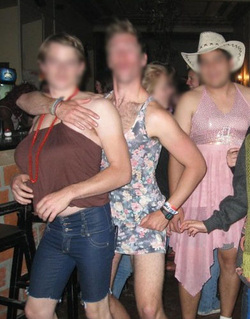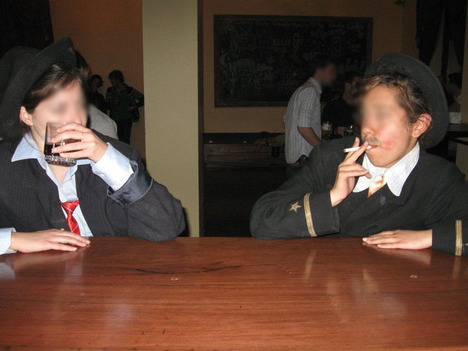“I only know of 2.”
“The Colombians?”
I nodded solemnly.
And ladies’ night happens all over town. At the Irish Rose hostel around the corner, its on Wednesday.
This weekend, at the invitation-only grand opening party for La Paz’s newest nightclub (I begged a friend to take me as his date), I overheard Ekko’s manager say he would change his ladies’ night to Thursday to coordinate with the new club’s ladies’ night.
In some ways, I enjoy the creativity inspired by Ekko’s ladies’ night. Backpackers don’t have a closet full of clothes to choose from. Smaller-statured men borrow skirts from female friends. Others flit their t-shirts through the neck to create a bikini-like effect. Eyeliner and lipstick are passed around the bar like joints in a college dorm.
But at the same time, the cross dressing that occurs for ladies’ night exists in the context of an explicit heterosexual orientation of many hostel events.
This is not to say that queer-identified guests are ostracized or unwelcome. I have met several gay men backpacking in South America and have reported fruitful social or love lives in hostels. Though they strain to find gay spaces in cities like La Paz, they recognize the hidden nature of gay life in many places in Latin America, and seem content with the small pockets of “gay life” they’ve been able to access.
The lesbian travelers I have spoken with express more disappointment. I have met noticeably fewer of them, and even in places more recognized as “cosmopolitan” or “gay friendly,” like Buenos Aires, they have not found explicitly lesbian spaces. And while I have heard both gay men and lesbians complain that there are not more potential sexual partners available (both among local populations and fellow travelers), I have not heard any complain about feeling unwelcome. Indeed, the traveling crowd tends to be young, liberal, and open to new experiences (though, obviously, that is a generalization with plenty of exceptions).
But hostels like Ekko also have implicitly and exclusively heterosexual activities like afternoon speed dating, in which the number of men and women were required to be even. Bar staff were required to participate or not in order to ensure equivalent numbers. I was most taken aback by one conversation prompt asking “If I used to be a different gender, would you mind?” Most people answered that they wouldn’t mind with very little thought or discussion, but much nervous laughter.
And so, as I said, I appreciate the creativity of ladies’ night, but cannot ignore the context in which it exists. The lack of attention to the politics of cross dressing, particularly in a place where gay pride parades attract 20,000 people in a metro area of over 2 million and few explicitly gay spaces exist, particularly by people who see their costumes as an opportunity to reveal their bodies in hopes of attracting the opposite sex, particularly in a space that organizes the event for the pure purpose of making more money on a Tuesday night, leaves me concluding it is a superficial use of gender inversion, devoid of political statement that serves to reinforce heterosexual assumptions about gender roles. And more specifically, reinforces a view of femininity as explicitly performative and sexualized. Though at least two young Israeli women dressed as dapper fedora-clad men last week.


 RSS Feed
RSS Feed
